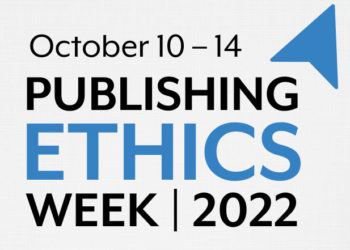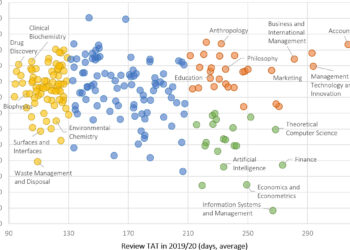Today’s guest post is by Mark Robertson, Publishing Consultant, and Rachel Moriarty, Oxford University Press and Chair of the STM ECPC mentorship program committee.
There was a terrific post on LinkedIn recently by Alison Labbate of Springer Nature; she said, “A wise man recently said to me that the first half of your career includes being helped and mentored by others. And that the second half is so much more satisfying because YOU are the one doing the helping and mentoring.” She was speaking of her own mentor, Shawn Morton of Wiley. The enthusiasm of the post illustrated the power of the mentor/mentee relationship that colleagues and friends enter into themselves. Some larger companies such as Springer Nature have internal mentoring programs, where senior colleagues are matched with early career colleagues. This is outside of the manager/colleague relationship, and is set up to help the colleague to understand and negotiate their way into a career path within the company. Although it is highly commendable that these programs are in place, there is the potential for misalignment of goals and/or bias, since an internal mentor/mentee relationship may not take account of wider opportunities in the profession at large or provide guidance about the potential to look at a career in another industry or profession. Another mentoring option is where a manager decides with one of their team that an external mentor might be a good idea to focus on a particular area for improvement. Sometimes this will involve paid-for professional mentors working through specialist mentoring organizations.

There is also a route outside of the workplace that allows for independence in the mentor/mentee relationship; that is, working with an organization that runs mentoring programs, in many cases across an industry. The Society for Scholarly Publishing (SSP), the proprietors of this illustrious blog, has a mentorship program, as does the Association of Learned and Professional Society Publishers (ALPSP). Both are well funded and, since mentees must be from publisher members, their focus is on meeting the needs of their memberships. The International Association for Scientific, Technical and Medical Publishers (STM) also has a longstanding program, which is currently unfunded, and is hosted by the Early Career Publishers Committee (ECPC).
Despite being around for nearly eight years, the STM program is not as well known as we would like in the research publishing community, or promoted as widely to both potential mentors and mentees, or to human resources departments across our member publishing houses. Data on the STM program shows strong support by some in our industry and none at all from others.
The STM mentoring program started in 2015 after a pilot with 20 mentor/mentee pairs the year before. The applications are anonymized and the mentoring subgroup of the ECPC do the pairings, matching mentees’ career goals and any specially requested needs with the most suitable mentors. Importantly, mentees are not paired with mentors from the same company.
In 2020 there was an extraordinary jump in participation, with 70 mentees, and 62 mentors, involving 20 companies This compared with 28 mentees and 21 mentors from 15 companies the year before. Since applications for the program are submitted at the end of the previous year, the increase was not due to COVID-19 demand, but the continued high numbers in 2021 could well be. This includes a growth in applications from mentees outside of the US and Europe, and, as you would expect, from the same global companies already using the program. Although the number of companies participating has been maintained, the number of mentees dropped to 53 and mentors to 38 in 2022. This imbalance makes it hard to ensure all mentees are well-matched, although the scheme is very lucky that many of the mentors are willing to take two mentees under their wing each year.
It is disappointing that, with 145 publisher members of STM, across 21 countries, only 20 companies are involved in the mentoring scheme. Furthermore, in the last five years, out of 274 mentors in total, only 17 have participated more than once. Another potential concern is that the majority of participants — both mentors and mentees — are from editorial departments. We aim to change this. We want to increase our pool of mentors and widen the program to include sales, marketing, production, technology, and HR; this would be of benefit to the whole profession and is something we strongly support. Given the feedback from this year’s mentors, where 70% of respondents said they would be interested in participating again, we are confident new mentors will find this program fulfilling.
Support is offered to mentors and mentees throughout the year, with introductory webinars early on, networking sessions and feedback meetings in the middle, and a survey of all participants at the end of the year. The overall feedback from those responding to the survey each year is really positive. In 2022, 42% of mentees and 32% of mentors responded, with 86% agreeing that the match between mentoring partners met their needs. In addition, 77% strongly agree that the program benefits the publishing industry and would recommend it to colleagues, with a further 17 % slightly agreeing. So a very high proportion of those involved value the program, but this is not translating into a growth in participation.
On Day 3 of STM Week in London, Thursday December 8 2022, the ECPC Members are running an open day under the theme “STM Ideas Factory and Bridging the Generational Gap in Publishing”, in which there will be a mentorship panel and brainstorming session on how to improve mentorship schemes. This will be an invaluable opportunity to set some strategies to widen the STM mentorship program across the member publishers and geographies. We hope to see many of you there.
In the free comments section of this year’s survey, one respondent said “I thank you for the opportunity to mentor. As a recent retiree (still quite involved in the industry) I find this particularly rewarding” — a sentiment shared by one of the authors here. As more and more is expected of all of our colleagues in doing their work, it is easy to assume that the extra time taken to be mentored or to be a mentor is not important nor of high value. Based on our experience, and that of the mentors and mentees we work with on the STM mentorship program, we can definitively state that, in fact, the reverse is true. It is vital that the STM mentorship program not only focuses on how to interest mentees, but also on encouraging those mid- and senior- career publishing professionals — including recent retirees — to join the program as mentors.
In addition to Rachel, the ECPC mentorship program committee are Samuel Goodchild (Springer Nature), Chris McEntee (Cambridge University Press), and Mikiko Senda (Wiley), and we thank them for their excellent work.
If you want to register for the STM Mentoring 2023 program either as mentors or mentees, please go to: https://www.stm-assoc.org/early-career-publishers/stm-mentoring-programme-2022/. Applications are open through Friday December 2, 2022.
Discussion
3 Thoughts on "Guest Post — The STM Mentorship Program"
Love this, and great work by Rachel Moriarty for her volunteer efforts in this area. Bring on 8th December.
Is it possible the overwhelming homogeneity among senior leaders at most of these publishing companies might be affecting the mentee experience?
In any mentoring program, the key points are ensuring that there are committed mentors, that the relationship between the mentees and mentors develops, and that the professional and/or career aspirations of the mentee can be the focus of the mentor/mentee engagement.



